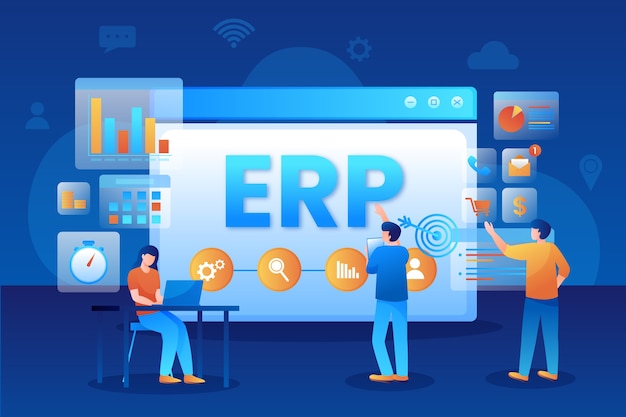Why ERP Implementation Is a Challenging Task: Challenges And Solutions
ERP automation systems are a boon to the business. Successfully implementing an ERP system can help you save labour efforts, money and time. This has caused a growing demand for ERP systems, which is projected to almost reach the mark of $125 billion by 2030, according to Grand View Research.
While ERP offers numerous features and benefits regarding scalability and automation, adopting the system is not that easy. ERP failures are common, and there are many reasons for them.
This blog post will help you understand why ERP implementation is a challenging task. We have also curated some winning strategies for successful ERP implementation. Read on to know more.

Why ERP Implementation Is A Challenging Task
A study reveals that almost 61.1% of ERP implementations take longer than expected. But what makes this delay, and why ERP implementation is a challenging task? Have a look at the reasons below:
Too Much Complexity
Implementing an ERP automation process is not simple and involves a lot of processes like:
Selecting the right software and vendor
Cleaning and migrating the data from the system
Integrating business functions like HR, finance, supply chain, etc
Customizing workflows
Involving stakeholders and employees
Testing the system before going live
Time-Intensive Nature
ERP implementation is not an overnight process - it takes time.
The planning phase alone can take months, involving detailed blueprints and scope definitions.
Customizing the system to suit your business adds additional time.
Training employees to use the new system requires ongoing effort, often delaying the go-live date.
High Stakes Decisions
Every decision in ERP implementation has ripple effects:
Selecting an incompatible system can disrupt operations.
Missteps in integration may result in data loss or operational downtime.
The risk of failure is high, and the impact on business operations can be catastrophic.
Communication Gaps
Effective communication is often overlooked but critical:
Misalignment between management and IT teams can derail the project.
Poorly communicated goals can lead to confusion among employees.
Stakeholders need constant updates to stay aligned with the project timeline.
Cost Implications
ERP systems are an investment—but the costs can escalate quickly:
Unforeseen issues like additional software licenses or consultant fees add to expenses.
Delayed timelines often lead to budget overruns.
Hardware upgrades or infrastructure changes may also be necessary.
Balancing Daily Operations
Implementing ERP while running a day-to-day business can stretch teams thin:
Employees may struggle to juggle regular tasks with ERP-related responsibilities.
Overworked teams can lead to burnout, errors, or delays.
Vendor Dependence
Relying on third-party vendors can bring its own challenges:
Delays in vendor support can slow down troubleshooting.
A lack of post-implementation support might leave businesses stranded after going live.
What Are The Challenges In ERP Implementation
Implementing an ERP system is not a walk in the park. Here are the top six challenges in the ERP implementation process:
1 Constant Technological Evolution
Technology changes faster than we can blink. Just when you’ve set up your ERP system, a new tech trend or update rolls in. What if we tell you the ERP system you installed will not be applicable after 2 years?
2. Customization Needs are Different
Not all businesses are the same, and neither are their needs. You’ll likely have to tweak your ERP system to fit your industry-specific processes. Sounds good in theory, but in practice? It’s costly, time-consuming, and often frustrating when customizations don’t work as planned.
3. Data Migration Issues
Migrating data to your new ERP system is like trying to find and move everything of value without breaking it. Duplicate records, missing files, or bad data quality can slow the process to a crawl—or worse, derail it entirely.
4. Resistance from Employees
Here’s a classic one: “Why do we need this new system? The old way works just fine.” businesses function because of people, and their trust is vital. Lack of buy-in from staff can delay the implementation.
5. Post-Pandemic Digital Transformation
COVID-19 flipped the script on how we work. While it brought in changes, it also came with its set of problems. Such as integrating the system into hybrid or remote work environments.
6. Budget Constraints
Not everyone has the funds and capital backup for investing in an altogether new system. Great if it works. But what if it fails? A failed implementation not only wastes money but can disrupt operations causing millions of losses.

Why Do ERP Implementations Fail?
Despite their potential benefits, ERP implementations fail more often than expected. Here’s why:
1. Lack of Clear Objectives
Without well-defined goals, businesses may lose direction during the implementation process, leading to confusion and inefficiency.
2. Underestimating Resource Needs
ERP projects demand time, money, and skilled personnel. Inadequate resource allocation often leads to delays and incomplete implementations.
3. Poor Vendor Selection
Choosing the wrong ERP provider can result in a system that doesn’t align with your business needs, leading to implementation failure.
4. Inadequate Training
Even the best ERP systems are useless if employees don’t know how to use them effectively. Lack of training leads to low adoption and operational inefficiencies.
How To Ensure Successful ERP Implementation
We know how ERP implementation can be a painful task. But, it can implemented with the following right strategies:
Plan out Your Business Goals and Objectives
Prepare a Detailed Roadmap
Research the right software for your needs
Involve Stakeholders throughout the process
Priortize Employee Training and Communication
Conduct Tests and take feedback
Monitor and maintain the software

What Are The Organizational And Change Management Challenges
Change, no matter how positive, can be daunting—especially for employees used to doing things the same way for years. We have listed some common challenges and how to overcome them.
1. Employee Resistance To Change
The biggest challenge you will face is questions like- “But we have been doing it this way forever, why need to change”? The employees' psychology stems from a comfort zone and fear of being replaced. Besides, an ERP implementation can be a huge step for small or medium enterprises.
To ease this resistance:
Communicate early and often - Explain how the ERP system is for their benefit. It will make their work easier. It allows them to focus on better issues.
Involve them in the process - Building confidence and trust is not easy. Start by taking their input and feedback (however small or silly). This way, you give them a sense of ownership.
2. Cultural Shifts
Adopting an ERP system altogether means breaking away from long-standing practices. Suppose a team has relied on manual data entry for years. Now, you bring in ERP like a ray of hope. So, that is a huge cultural shift, which can be unsettling as the team may struggle to accept an automated ERP system out of nowhere.
Disrupting established norms can be unsettling, but here’s how to manage it:
Reframe the change: Position the ERP system as a tool for growth and innovation rather than a disruption.
Encourage collaboration: Use the implementation as an opportunity to unite departments. You can try fostering a teamwork culture.
3. Managing Expectations
Another hurdle is aligning employees' expectations with the realities of ERP implementation. Some might expect instant results, while others fear the system will be too complex.
To set realistic expectations:
Be transparent about timelines and talk about improvements.
Celebrate small wins to build confidence and momentum.
At the heart of these challenges lies the need for clear communication and employee training. Change is never easy. But with the right approach, it can be a stepping stone to long-term success.
Why Is Training Essential In ERP Implementation?
ERP systems are transformative, but their success depends on how well employees adapt to them. As Travis Anderegg says - “An ERP system cannot be installed without the capability of an organization to change.” For that, training becomes important.
Without proper training, even the most advanced ERP systems can face low adoption rates and inefficiencies.
1. It fills Knowledge Gaps
A new system means new technology, and that equals to anxiety for employees as they don’t have all knowledge.
Proper training programs help bridge these gaps by:
Ensuring employees understand how to navigate the system confidently
Minimizing errors and inefficiencies caused by unfamiliarity
Addressing their reluctance to change by having open conversations
Promoting a standardized approach in all departments
2. Promotes Long-term success through Continuous Learning
ERP systems evolve with growing business needs. So, employee training should also evolve alongside them.
Ongoing training is essential to:
Keep employees updated on new system features or upgrades
Reinforce best practices and improve system efficiency
Encourage adaptability in dynamic business environments
Prevent risks like security breaches due to improper system usage
Why Is Post-Implementation Support Crucial?
Major glitches and problems arise after the ERP implementation goes live. The issues can be:
Poor quality ERP data
- Inability to utilize the system for maximum benefits
- Over customization of the ERP system
- Employees struggling due to inadequate training
- Operational losses due to failure in data integration.
The list can go on and on with issues. Hence, post-implementation support is important to check the system works as intended and is secure in functioning. If any issues arise, the vendor's involvement can help resolve them.

Importance Of Proper Vendor Selection In ERP Implementation
Vendor selection can make or mar your ERP software implementation process. Hence, selecting the right vendor is a must. At Ekklavya, we not only curate the software for your business but also become your lifetime partners for successful implementation.
Vetting vendors ensure you get the following:
Customised solutions for your business needs
Smooth onboarding and staff training
Post-implementation support
Resources for troubleshooting
Regular system audits and software updates.
At Ekklavya, we draw inspiration from our namesake, the legendary archer of The Mahabharat, who achieved excellence through dedication and practice. With over 30 years of expertise, we have served result-driven IT solutions to businesses across India and beyond.
If you need assistance with ERP software implementation, contact us with your requirements, and our team will reach out!
Frequently Asked Questions About Why ERP Implementation Is A Challenging Task
ERP system implementation is difficult because -
Employees resist change in their routine work.
Lack of training and expertise to handle a complex ERP system.
Lack of management support and effective leadership
Data problems like duplicate or missing data from the system.
To avoid ERP implementation failure, follow these golden strategies:
1. Plan the goals of your project
2. Set realistic expectations for top-to-bottom personnel
3. Priortize training of employees
4. Get agreement of all stakeholders
5. Change management to avoid resistance
6. Create an open communication environment
7. Conduct A/B tests before going live